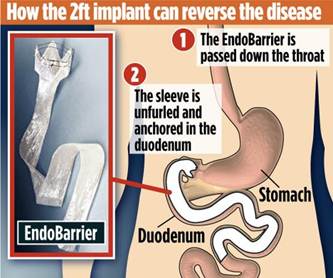An implanted sleeve that looks like a giant sausage skin is being used to battle against the most common form of diabetes. The 2ft-long device, developed as an incision-less alternative to a type of weight-loss surgery known as a duodenal switch, can reverse the disease within weeks.The duodenum is the name for the first 10 to 12in of the small intestine, which attaches to the stomach.
A duodenal switch is a keyhole procedure that involves making two incisions at the start and end of the duodenum. The lower part of the intestine is attached to the stomach, forming a new pathway. Food then bypasses most of the duodenum, which limits absorption. It is a plastic sleeve that lines the duodenum, meaning food can only be absorbed lower down the intestine.
During trials researchers found that in obese patients who also suffered diabetes, the disease went into remission. Initially experts believed it was a result of weight loss – but many patients were able to stop taking their diabetes medication before they began to lose weight.
Dr John Mason, consultant gastroenterologist at Trafford Healthcare NHS Trust, who implanted the first EndoBarrier in the UK believes that with the sleeve, the duodenum is bypassed, altering the balance of hormones in the body leading to a reversal in diabetes symptoms. Results from a new study at Musgrove Park Hospital, Taunton, Somerset, show that in 72 per cent of cases, diabetic patients went into remission after the EndoBarrier was fitted, and after a year all had no need for medication.
|
 |

